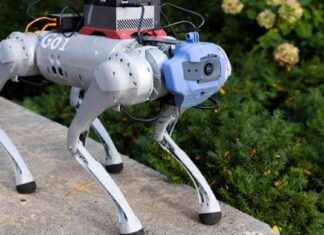Bundesliga soccer club Hertha BSC does not start training until the end of the month. But the commitment of the new coach Sandro Schwarz provokes criticism in advance. Because he continued to work at Dynamo Moscow even after the Russian invasion. Emotionally, he explains what moved him.
Sandro Schwarz has not yet arrived in Berlin. As the new coach of Hertha BSC, he is only responsible for the coming season, with training starting on June 22nd. A first media round takes place online, not in the office of the Bundesliga soccer club. Black is sitting in a white T-shirt in a bare room with white walls and some stucco on the ceiling. The 43-year-old just lost the Russian Cup final with Dynamo Moscow and then said goodbye to the club. Only now, critics accuse him of.
And this “only now”, it is probably the main reason why Schwarz is presenting himself before his official presentation on June 20th. He is there online to introduce himself, to present his ideas for and with Hertha BSC – but above all to explain this “only now”. The coach does it extremely emotionally.
“As a person, I completely condemn aggressive war,” he explains, visibly moved. He didn’t stay for sporting or economic reasons, but out of a sense of responsibility. “What I can say, the people from the Dynamo environment, are good people who have a clear stance, like all of us, on the subject,” said Schwarz. Since February 24 he had “had a lot of conversations”. The date of the Russian attack on Ukraine is burned into Schwarz’s mind, and he repeats it frequently. “It was important to me to find out the mood of my fellow human beings from these terrible pictures. These conversations showed that we as a group are going through this very, very difficult moment together,” he explains his decision to stay with Dynamo in Moscow . But he can understand the critical questions, emphasizes Schwarz.
He went a different way than Daniel Farke and Markus Gisdol, the other two German coaches who immediately gave up their jobs in Russia. There was no exchange with them, says Schwarz, who sees that all three are “thrown into one pot”. The former Mainz coach attaches great importance to evaluating their situation differently. Farke only started his job at FK Krasnodar in January. “If airports are closed and the family cannot be reached,” it is different from him, who has been working with his team for 15 months, says Schwarz.
Nevertheless, he also felt the “expectation” that he should return to Germany. “The statement that I would have to leave the club immediately, I can understand that,” he says now. His “inner turmoil” never went away, he checked every day whether he still stood by his decision, but it was more important for him that he was an “anchor”, a “reference person” for his players, his Staff says the coach says. Players often sat with him and they “cried together”. “If you think about young Russian players being drafted, it creates fears,” he explains. “I know that I was an important contact.”
The war that his employer’s country is waging in Ukraine also had an impact on his life in Moscow. It quickly became clear to him that he did not want to return after the summer break, and his two-year contract was terminated. “It was also clear, regardless of a new contract, that I would retire. Also for my family,” explains Schwarz. A lot has changed for his children at school. It was inconceivable for him to “come home and fly back after three or four weeks”. “People’s fears, the feeling of being separated from the rest of the world,” the 43-year-old says, are also felt in Moscow. Many have relatives and friends in Ukraine, players are closely connected. “The situation was very challenging.”
Although he lost the cup final with Dynamo to city rivals Spartak, he was celebrated by the fans at his farewell – and he celebrated with them with Pyro. But now, back in Germany, he is “extremely relieved that the pressure situation for everyone involved is over.” He says it with the knowledge that he has left “extraordinary, good people, friends too” during this “difficult time”.
But now it is time to focus on Hertha BSC. “There should be energy on the pitch from the first day of training,” says Schwarz, emphasizing: “We want to approach the matter with humility, but work hard.” He talks about the sense of community, about each other – qualities that his new club has often lacked in the past. His previous Dynamo employees, assistant trainer Volkan Bulut and video analyst Daniel Fischer will help him. A new addition is Tamas Bodog, with whom Schwarz had already worked in Mainz. The trio with the long-time Herthan Vedad Ibisevic – the former striker is now the offensive coach, athletics coach Hendrik Kuchno and goalkeeping coach Andreas Menger stays.
Experienced right-back Peter Pekarik, who is in his 13th year at Hertha, will also stay. “I already noticed that Peka extended today,” says Schwarz jokingly, emphasizing that he has long been involved in squad planning. Meanwhile, the new coach leaves open what will become of the other Hertha veteran Kevin-Prince Boateng. After staying up in the relegation against Hamburger SV, the 35-year-old said he could imagine staying for another season. There should be face-to-face meetings, not phone calls. They should be “open and honest”. A premise with which he apparently goes into all discussions. He just showed that at his first performance in Berlin.







